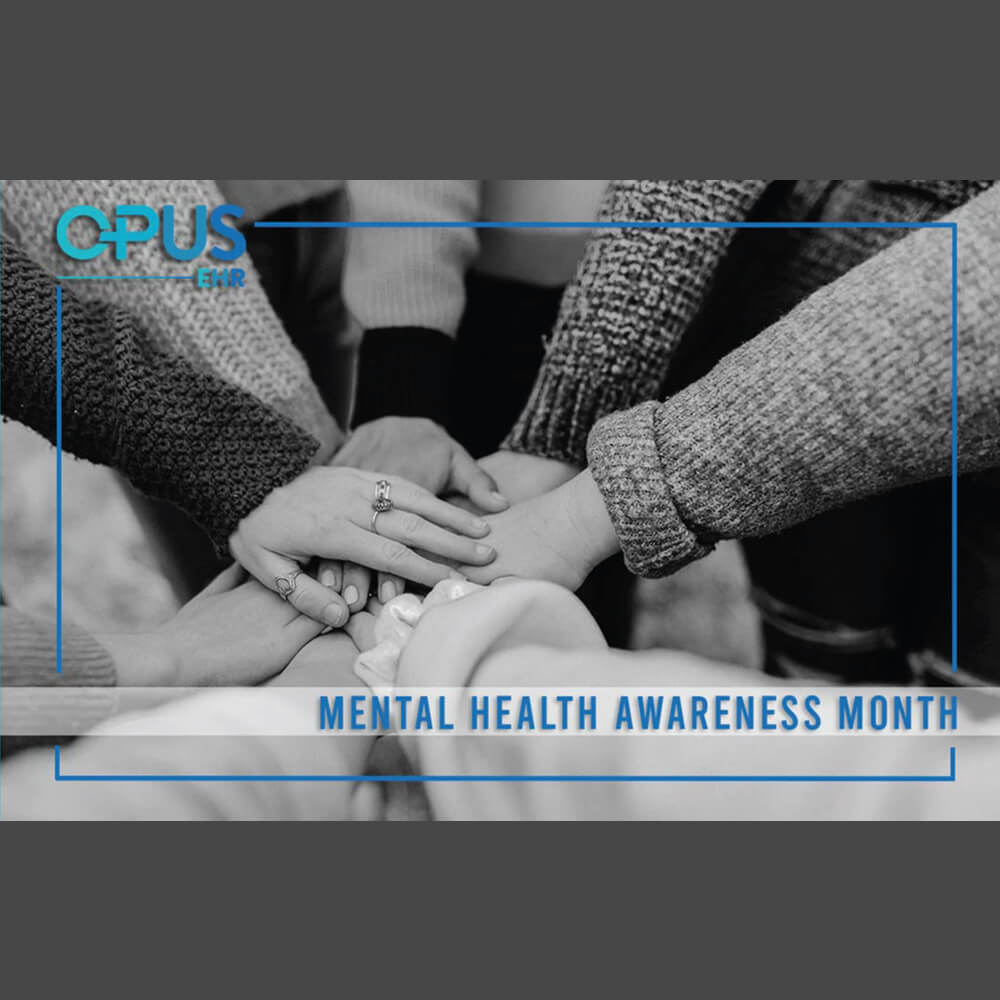
Opus Spark May 2022
CEO's Awareness Message
Mental Health Awareness Month In 1949, Mental Health Awareness Month was established to increase awareness of the importance of mental health and wellness in Americans' lives and to celebrate recovery from mental illness. National Mental Health Awareness Month in May focuses on bringing tools, resources, and education to the general public. Today Mental Health is all around us, but, what exactly is mental health? Mental health is a person’s general sense of emotional, psychological, and cognitive well-being. Everyone experiences mental health every day, but it’s often ignored unless something is going seriously wrong. The best way to prevent that is to pay attention to your mental health even when you are feeling okay or even good. Notice how your mental health is always changing. Yesterday might have been a better day than today, and that’s okay. Part of being human is moving with your emotions and knowing when something isn’t going exactly how you want it to, check-in with yourself, and reaching out to your friends and family for help when you need to take some time for your mental health, or don’t know what to do. Here are a few tips for taking care of yourself:
- Accept yourself as you are.
- Give yourself grace.
- Write down your daily accomplishments rather than, or in addition to, your to-do list.
- Celebrate those accomplishments.
- Create a self-care plan to support your mental well-being in your daily life.
- Finding joy, connecting with others, helping others, learning something new, and finding spiritual connections on a daily basis can help us flourish.
- Make small goals, taking time for yourself is not something that will happen overnight.
- Get out in nature, and be present with your surroundings. We want to remind everyone that it is OK to ask someone for help. There are local resources available to anyone needing this additional support. Reach out to your local organizations as they are there to assist you. We at Opus wish you the very best.
Clinician of The Month
Anna Griest is currently serving as the Clinical Manager for Recovery Unplugged‘s Virtual Intensive Outpatient Program. She has a calling for helping people through recovery as she discovered this passion during her undergraduate time at Vanderbilt University while pursuing another field.  During her undergrad, she wanted more fulfillment by helping others and decided to pursue higher education in the Clinical Counseling field. Her career started as a Primary Therapist in the detox and residential levels of care, she did so well that she was promoted quickly. Anna holds a Master of Education in Clinical Mental Health Counseling and has been working for 4 years in the addiction and mental health field. Anna has continued to put her clients first and has delivered excellent person-centered services at Recovery Unplugged. She is always willing to go above and beyond to provide high-level services. For example, Anna helped repair a client's relationship that was hurt due to addiction and alcoholism to a level where this client is still sober today after over 18 months and raising his child together with his wife. She has a direct passion for impacting people's lives and helping people shift perspectives that lead to a healthier and happier life. Through Anna’s time there, Recovery Unplugged saw that a massive need existed for individuals in the Nashville community who did not possess the privilege of being able to complete the full continuum of care, which can be upwards of a four-month commitment. They decided to establish their Virtual IOP program in August 2021, where Anna was chosen to move into the Clinical Manager role and is currently responsible for the stewardship of the program. As the lead, Anna and Recovery Unplugged continue to offer these exceptional services to more individuals in need. The program is currently offered in TN, FL, TX, and VA.
During her undergrad, she wanted more fulfillment by helping others and decided to pursue higher education in the Clinical Counseling field. Her career started as a Primary Therapist in the detox and residential levels of care, she did so well that she was promoted quickly. Anna holds a Master of Education in Clinical Mental Health Counseling and has been working for 4 years in the addiction and mental health field. Anna has continued to put her clients first and has delivered excellent person-centered services at Recovery Unplugged. She is always willing to go above and beyond to provide high-level services. For example, Anna helped repair a client's relationship that was hurt due to addiction and alcoholism to a level where this client is still sober today after over 18 months and raising his child together with his wife. She has a direct passion for impacting people's lives and helping people shift perspectives that lead to a healthier and happier life. Through Anna’s time there, Recovery Unplugged saw that a massive need existed for individuals in the Nashville community who did not possess the privilege of being able to complete the full continuum of care, which can be upwards of a four-month commitment. They decided to establish their Virtual IOP program in August 2021, where Anna was chosen to move into the Clinical Manager role and is currently responsible for the stewardship of the program. As the lead, Anna and Recovery Unplugged continue to offer these exceptional services to more individuals in need. The program is currently offered in TN, FL, TX, and VA.
OPUS EHR EXPERT FEATURE
Measurement tools are used to gather data across different mental health outcome measures for client treatments. Facilities can request data from Opus who sends them the raw data to analyze. The data produces results showing client progress to determine the length of stay and effective treatments.
Opus has assessments including self-scoring, customizable and standard and non-standard, create your own, and PTSD screening.
OMT Benefits:
- Full collection of industry-standard assessments to choose those that best fit your practice
- Create and integrate your scoring assessments to accurately measure outcomes
- Easily automate the administration of scales to a client portal
- Visualize and report on client scores using graphs and see what’s trending over time
- Compare client scores across a time frame
- Reference client scores while multitasking within your notes
- Create and administer custom surveys and assessments (e.g. patient satisfaction survey)
- Accredited by the Joint Commission
Industry News
Behavioral Health clinicians have been collecting patient feedback for years. The practice of collecting assessments on perceived results has helped practices implement new methods based on the data collected. The insight gained on viewing patient information from their perspective made them feel empowered by offering input to help improve the treatment process. The tracking of cause-and-effect metrics also helps Behavioral Health caregivers fine-tune their approach. With an increased emphasis on therapies that are perceived to be more helpful by the patients themselves. Seeking insight into unknown conditions is the best way to ensure that evaluations of experimental data are objective to provide a more experimental condition for the evaluator. On the other hand, patient records must be linked to that patient, or the evaluation of a successful treatment program won’t be able to be connected back to their caregivers. Addressing this challenge requires data organization that is a step above with an outcome measurement tool (OMT), a powerful, yet easy to work with the assessment process.
The Outcome Measurement Tool (OMT) feature of Opus EHR fills this practice scope need. These assessments meet the Joint Commission standards requiring standardization of the survey tools. The use of outcomes to guide and improve the individual care received, and the use of data by organizations to tailor programs and services to the populations they serve has been a gamechanger in the behavioral health space. The comprehensive data provided by the OPUS OMT will not only meet the current standards of data use and protection but will evolve as those standards change to meet the needs of Behavioral Healthcare providers and patients in the future. In addition, these assessments provide a higher pay-per-performance reimbursement from the insurance company. Using the OMT feature of Opus EHR in a practice is surely a win-win.
